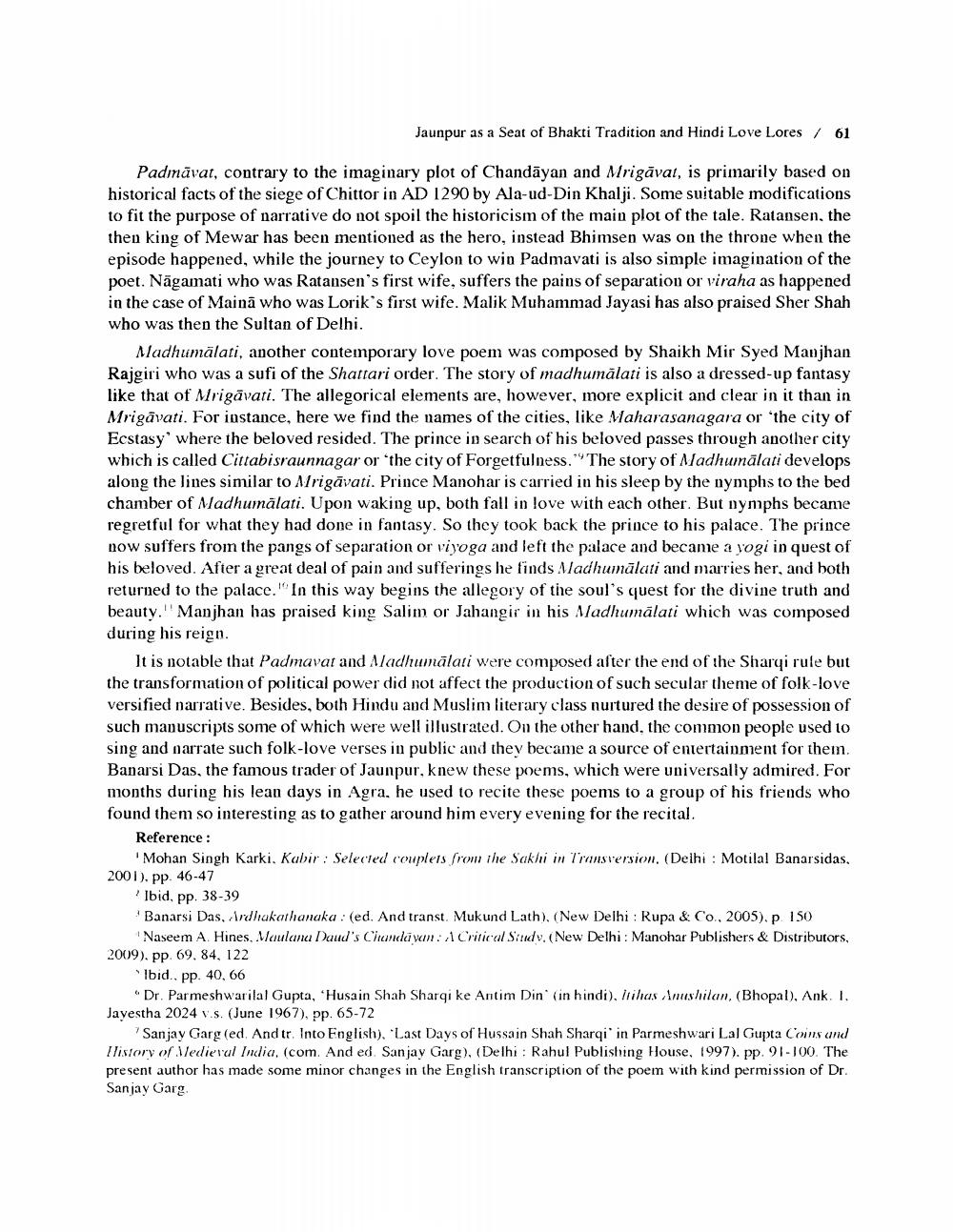________________
Jaunpur as a Seat of Bhakti Tradition and Hindi Love Lores / 61
Padmavat, contrary to the imaginary plot of Chandāyan and Mrigävar, is primarily based on historical facts of the siege of Chittor in AD 1290 by Ala-ud-Din Khalji. Some suitable modifications to fit the purpose of narrative do not spoil the historicism of the main plot of the tale. Ratansen, the then king of Mewar has been mentioned as the hero, instead Bhimsen was on the throne when the episode happened, while the journey to Ceylon to win Padmavati is also simple imagination of the poet. Nāgamati who was Ratansen's first wife, suffers the pains of separation or viraha as happened in the case of Mainā who was Lorik's first wife. Malik Muhammad Jayasi has also praised Sher Shah who was then the Sultan of Delhi.
Aladhumälati, another contemporary love poem was composed by Shaikh Mir Syed Manjhan Rajgiri who was a sufi of the Shattari order. The story of madhumalati is also a dressed-up fantasy like that of Mrigāvati. The allegorical elements are, however, more explicit and clear in it than in Mrigāvati. For instance, here we find the names of the cities, like Maharasanagara or the city of Ecstasy' where the beloved resided. The prince in search of his beloved passes through another city which is called Cittabisraunnagar or 'the city of Forgetfulness." The story of Madhumalati develops along the lines similar to Mrigāvati. Prince Manohar is carried in his sleep by the nymphs to the bed chamber of Madhumälati. Upon waking up, both fall in love with each other. But nymphs became regretful for what they had done in fantasy. So they took back the prince to his palace. The prince now suffers from the pangs of separation or viyoga and left the palace and became a vogi in quest of his beloved. After a great deal of pain and sufferings he finds Madhumälati and marries her, and both returned to the palace. In this way begins the allegory of the soul's quest for the divine truth and beauty. Manjhan has praised king Salim or Jahangir in his Madhumălati which was composed during his reign.
It is notable that Padmavat and Aladhumālai were composed after the end of the Sharqi rule but the transformation of political power did not affect the production of such secular theme of folk-love versified narrative. Besides, both Hindu and Muslim literary class nurtured the desire of possession of such manuscripts some of which were well illustrated. On the other hand, the common people used to sing and oarrate such folk-love verses in public and they became a source of entertainment for them. Banarsi Das, the famous trader of Jaunpur, knew these poems, which were universally admired. For months during his lean days in Agra, he used to recite these poems to a group of his friends who found them so interesting as to gather around him every evening for the recital.
Reference:
Mohan Singh Karki, Kabir: Selected couplers from the Sakhi in Transversion. (Delhi : Motilal Banarsidas. 2001), pp. 46-47
Ibid, pp. 38-39 Banarsi Das, Andhakathanaka : (ed. And transt. Mukund Lath), (New Delhi : Rupa & Co, 2005), p. 150
Naseem A Hines, Maulana Daud's Chandava1 Critical Study. (New Delhi : Manohar Publishers & Distributors, 2009), pp. 69, 84, 122
"Ibid., pp. 40, 66
"Dr. Parmeshwarilal Gupta, "Husain Shah Sharqi ke Antim Din (in hindi), irihas Anushilan, (Bhopal), Ank. I. Jayestha 2024 v.s. (June 1967), pp. 65-72
Sanjay Garg (ed. And tr. Into English). Last Days of Hussain Shah Sharqi in Parmeshwari Lal Gupta Coins and History of Medieval India, (com. And ed. Sanjay Garg), (Delhi : Rahul Publishing House, 1997). pp. 91-100. The present author has made some minor changes in the English transcription of the poem with kind permission of Dr. Sanjay Garg




